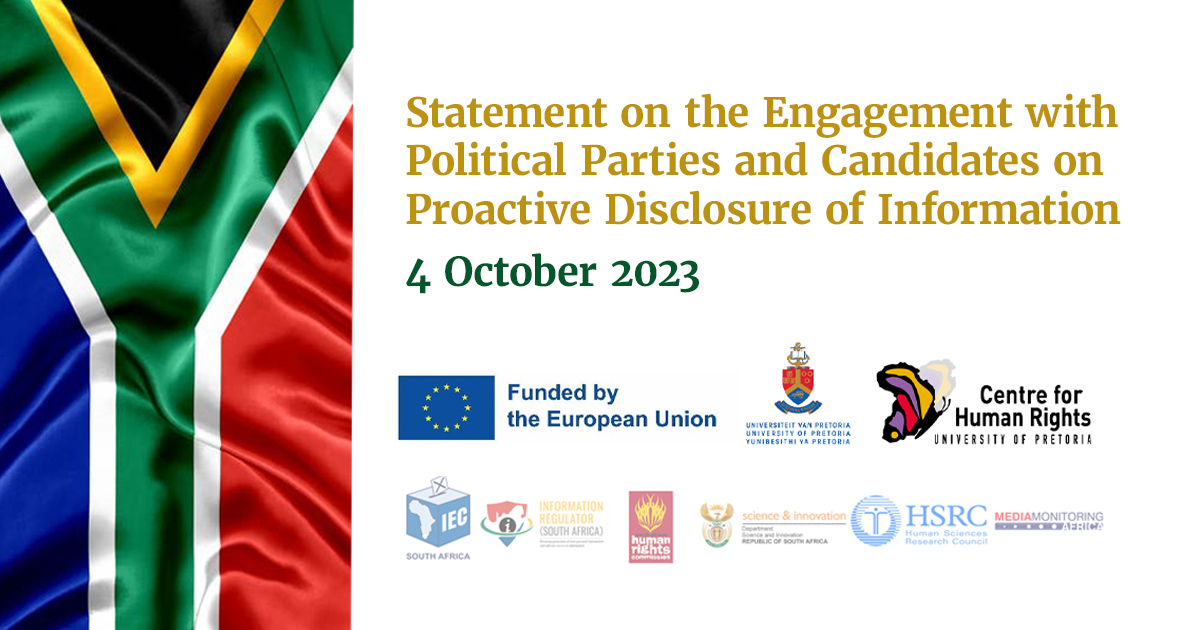On 4 October 2023, the Centre for Human Rights, University of Pretoria, in collaboration with the Independent Electoral Commission of South Africa (IEC), the Information Regulator (IR), the South African Human Rights Commission (SAHRC), the Human Sciences Research Council (HSRC) and Media Monitoring Africa (MMA) held an engagement with political parties and candidates in Johannesburg to discuss the role of political parties and candidates in promoting access to information ahead of the 2024 elections.
- The engagement is part of an ongoing advocacy project to implement the recommendations of the report on Proactive Disclosure of Information and Elections in South Africa’. The study assessed South Africa’s compliance with the Guidelines on Access to Information and Elections (the Guidelines) during the 2019 national and provincial elections. A fact sheet on proactive disclosure during the 2021 local government elections, complements the report’s findings on compliance with the Guidelines. The Guidelines were developed by the African Commission on Human and Peoples’ Rights (the African Commission) in 2017 to promote access to information during elections in Africa.
- The instrument outlines the obligations of electoral stakeholders to proactively disclose information throughout the electoral cycle. Guidelines 20 to 22 detail the obligations of political parties and candidates. The implementation of the Guidelines by State parties is envisioned to contribute to transforming electoral processes in Africa by promoting electoral transparency, accountability, and meaningful participation in elections by an informed electorate. Towards promoting the implementation of the Guidelines, in particular guidelines 32 and 33 on dissemination of and training on the Guidelines, the Centre and its partners hosted the engagement with political parties and candidates.
- Representatives from the African National Congress (ANC), Democratic Alliance (DA), Freedom Front Plus (VF Plus), Pan Africanist Congress of Azania (PAC), Al Jama-ah, African Christian Democratic Party (ACDP), GOOD Party, and Patriotic Alliance (PA) attended the meeting. During the engagement, the participants unpacked the access to information obligations of political parties and candidates under the Guidelines, and South Africa’s normative framework including the Constitution, the Promotion of Access to Information Act, 2000 and the Political Party Funding Act, 2018.
- Further, the participants discussed the report and factsheet findings on disclosure by political parties and candidates in the 2019 and 2021 elections. The use of digital technologies by political parties to facilitate access to information was highlighted. However, more could be done with reference to the recommendations of the 2020 report.
- The IR underscored compliance with PAIA as well as the PAIA Amendment Act 39 of 2019 by political parties. The Chairperson of the IR informed participants that the Regulator had conducted an assessment of political party compliance with these laws and the report would be released in due course. The presentation also emphasised the need to balance competing interests between access to information, and the right to privacy and protection of personal information.
- The IEC reported on efforts to facilitate proactive disclosure of information relevant to political parties and candidates and the general public throughout the electoral process. However, the presenter highlighted the difficulty in incorporating independent candidates within the funding disclosure framework.
- Also explored were the challenges and opportunities towards enhanced access to information practices by political parties and candidates ahead of the 2024 elections in South Africa. The spread of misinformation and disinformation was underscored as a challenge to electoral information integrity that required the concerted efforts of all electoral stakeholders. MMA presented some of the tools they have developed to address information disorder including the Real411, the Political Ad Repository (PAdRE), and a monitoring civil tech tool called DEXTER.
- The presentations and the feedback from the participants drew out recommendations on the role of political parties in promoting access to information during elections in South Africa as outlined below:
- The legislative framework of South Africa is the yardstick for minimum standards of disclosure for political parties and candidates. The Guidelines, on the other hand, strengthen the realisation of access to information during elections and serve as a crucial aspirational standard for electoral stakeholders in South Africa. Further, its implementation promotes compliance with international law and standards.
- The Guidelines are an important standard-setting document but its implementation should be contextually relevant and feasible. For example, disclosing details such as party agents and representatives may threaten their security in certain areas. Additionally, resource constraints may limit compliance by some political parties.
- There is a need for further capacity building for political parties to enhance compliance with relevant legal obligations on proactive disclosure including PAIA, Protection of Personal Information Act (POPI Act), Political Party Funding Act, 2018 and other relevant norms at national and international level.
- The upcoming report by the Information Regulator on PAIA compliance by political parties will be an important reference point to guide political parties in undertaking their obligations at the national level.
- The right to privacy is a fundamental right protected under article 14 of the Constitution of South Africa and other relevant national laws. There is a potential tension between protecting the rights to privacy and personal data, and access to information. A case-by-case consideration is necessary to consider how to balance the rights when implementing PAIA.



